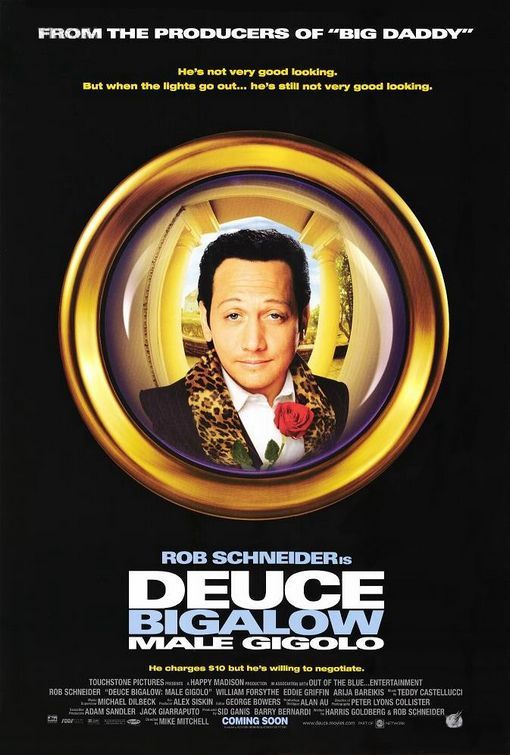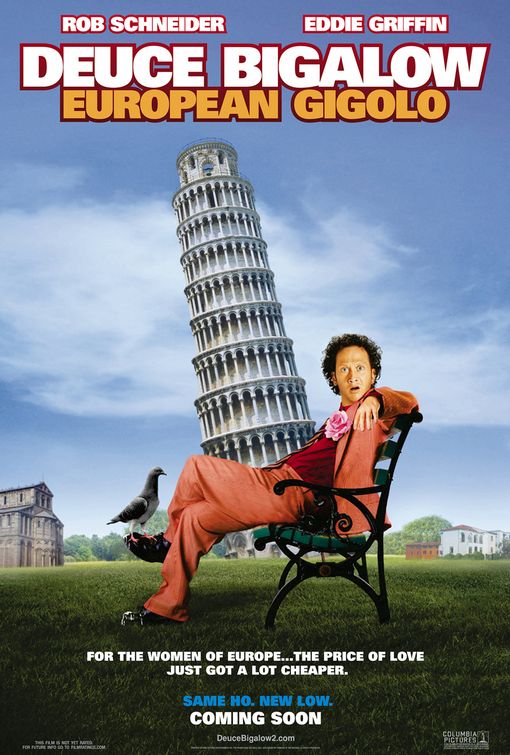
One of the main Hollywood trends that everyone knows about
at this point in time is franchising.
Whether that means sequels, spin-offs, prequels, remakes, reboots, or
anything else of that sort, the studios in Hollywood want a dependable
franchise on which they can get lots of money.
It all comes down to money. If
something makes money, the studios will make another movie. However, the quality of the sequel is not an
issue for the studios. They want the
movie, not the art.
This is only part of the reason that there tends to be a
decline in the quality of a movie series the further it continues on. The movies become more about the money than
the actual movie and that hurts the overall product. That much is obvious. Of course, there are a few exceptions. Sometimes the best film in a series comes
later. However, in most cases, the
movies have a declining quality that deteriorates what was once good.
Take, for example, the Deuce Bigalow movies. These are nothing special. I won’t try to tell you that the first movie
is an exceptional comedy. It’s fairly
low brow. The idea is that Rob Schneider
ends up in a bad situation and must resort to prostitution. The problem is, he ends up with the women
that nobody wants, and he does not want to have sex with them. Instead of pleasuring them sexually, he
pleasures them emotionally. He also
falls in love with a girl during this escapade.
It’s not anything groundbreaking.
But the story at least had a touching sentiment to it that resonated,
even in the smallest way.

The first Deuce Bigalow film made enough money for the
studio to become invested in making a sequel.
It took a while though. The
sequel was released six years after the original. So, I guess it wasn’t a priority. This lack of interest, yet investment in
money, makes the results all the more sickening.
Whereas Deuce Bigalow: Male Gigolo had a heart to it that
made the viewer care about the characters (most of them, at least), Deuce
Bigalow: European Gigolo felt stiff and empty.
There was a tiny bit of that same heart left over from the original, but
a lot of the rest was replaced with racist jokes, pot jokes, and pretty much
any other offensive type of joke that you can think of. It was as if Rob Schneider didn’t want to
make the movie, but was forced into it.
The focus is brought onto an annoying pimp character that spends the
majority of the movie in various disguises, being mistaken as a gay man. Yeah, this movie has homophobic jokes as
well. It’s feels like the entire sequel
was made to destroy any connection that the viewers could have with the
characters.
Sometimes when a sequel is made, the parts of the original
that are highlighted by the filmmakers as the successful points are just the
opposite. The sequel thus plays off of what
didn’t work in the first movie. This is
especially true of comedies, where much of the movie is subjective. Everyone has a different taste of humor. This is why it is hard to predict audience
reception to a comedy. Perhaps the
aspects of Deuce Bigalow: European Gigolo that I dislike are actually the parts
of Deuce Bigalow: Male Gigolo that played well with audiences. The issue I have is that I didn’t see the
overall offensiveness in the first movie.
It was only in the sequel where it came right out and beat me over the
face.
The only reason that Deuce Bigalow: European Gigolo exists
is due to the studio wanting more money.
Is this reason enough to make a bad movie? Should studios be producing movies of this
quality in order to make a quick buck?
Or should studios put this money into making other movies with more
potential better? I don’t know the
answers to these questions, but I do know that in the case of Deuce Bigalow:
European Gigolo, they put out a movie that I truly do not like. That seems as offensive as the humor in the
movie, itself.

There are some notes that I would like to make:
- Deuce Bigalow: European Gigolo earned five Razzie nominations (excluding the decade special). They were for Worst Picture, Worst Actor, Worst Screen Couple, Worst Screenplay, and Worst Remake or Sequel. It won for Worst Actor, making it the first Razzie winner featured in the Sunday “Bad” movie posts.
- Rob Schneider, Eddie Griffin, Arija Bareikis, Oded Fehr, Pilar Schneider, and Norm MacDonald each appear in both movies.
- This is the second time I've covered a movie series. The first was Death Race.
- If you would like to suggest a movie, feel free to leave a comment or tell me on Twitter.
No comments:
Post a Comment